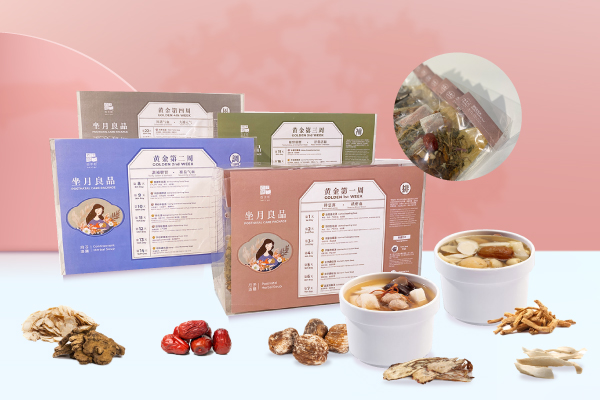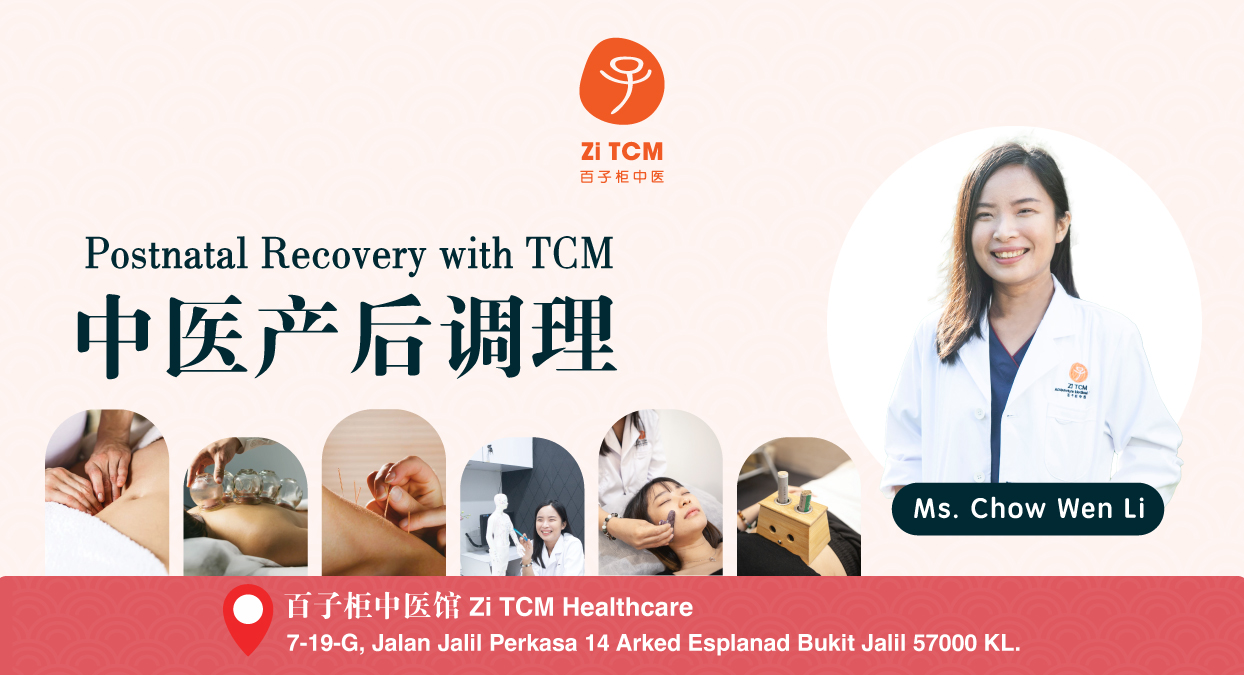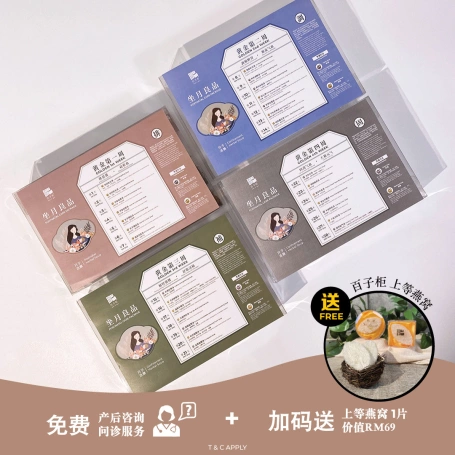Are Traditional Postpartum Taboos Passed Down by Elders Reasonable? | Bai Zi Gui

When the arrival of a newborn brings joy to the family, new mothers often find themselves facing a host of postpartum taboos and customs passed down by older generations. These include not being able to wash your hair, not being exposed to the wind, and only eating certain types of food. These traditional customs surrounding postpartum recovery are often confusing and full of mystery. But in today’s modern world, where medical science is constantly advancing, many new mothers are left wondering: Are these taboos really beneficial for postpartum recovery? Do they still apply to today’s modern moms?
Traditional postpartum care is rooted in Chinese medicine theory, focusing on restoring vital energy (Qi) and repairing the body after childbirth. However, modern medicine and nutrition science offer more scientifically backed advice for postpartum care, such as a balanced diet, moderate activity, and proper hygiene. So, how can we strike a balance between following tradition and embracing modern practices? This is a question every new mother and her family must consider.
In this article, we will explore common postpartum taboos, their scientific basis, and how to combine modern medical advice to ensure that new mothers can recover healthily while honoring traditional care practices. Additionally, we will introduce Bai Zi Gui's postpartum products, such as the Postpartum Care Herbal Soup Package, which helps new mothers restore energy and health during their recovery period.
What Are Postpartum Taboos?
Postpartum taboos refer to a series of lifestyle and dietary restrictions that women are expected to follow after childbirth in Chinese culture. This period, typically lasting 30 to 40 days, is known as "doing the month" (坐月子), during which new mothers are encouraged to rest and recover their strength while avoiding certain activities that could lead to future health problems, such as rheumatism or chronic pain.
These taboos mainly focus on dietary and lifestyle practices, rooted in traditional Chinese medicine (TCM). The belief is that after childbirth, a woman's body is weak, with a deficiency in both Qi and blood, and thus needs time to recover and avoid cold or dampness entering the body.
Common Postpartum Taboos Passed Down by Elders
1. No Washing Hair or Bathing
One of the most well-known postpartum taboos is the prohibition of washing hair or bathing for an entire month. Traditionally, it is believed that postpartum women should avoid cold water and moisture, as this can allow cold air to enter the body, leading to ailments such as joint pain or rheumatism.
Modern Medical Perspective:
In the past, when bathing facilities were often located outdoors, the risk of catching a chill after bathing was a legitimate concern. However, modern homes are equipped with proper bathing facilities and climate control, making it much easier to maintain a warm, comfortable environment. According to Wang Wenyu, a head nurse and postpartum care expert, modern women can wash their hair and bathe as long as precautions are taken, such as using warm water, ensuring the bathroom is adequately heated, and drying the body and hair immediately after. She also recommends using traditional herbal remedies like dafengcao (a type of Chinese medicinal herb) to help warm the body and prevent chills after bathing.
For mothers who have undergone vaginal deliveries, bathing presents fewer risks, but it is still essential to dry off quickly. On the other hand, those who have had cesarean sections need to be more cautious. Due to the larger wound from surgery, Wang advises that they avoid bathing for the first two weeks postpartum and instead use sponge baths to keep their bodies clean, ensuring the wound remains dry to prevent infection.
2. Mothers Should Remain Bedridden, Avoid Walking or Standing
A traditional saying goes, “If you can sit, don’t stand; if you can lie down, don’t sit,” urging new mothers to rest as much as possible. While this advice is intended to help mothers recover, prolonged bed rest can lead to muscle atrophy and delayed recovery.
Modern Medical Perspective:
Advances in medical practices, including improved stitching and recovery techniques for childbirth wounds, mean that new mothers no longer need to remain bedridden for extended periods. Wang Wenyu suggests that while rest is important, new mothers should also engage in gentle exercises, as physical movement can aid in recovery and prevent issues like muscle atrophy and blood clots.
Recommended postpartum exercises include:
-
Diaphragmatic Breathing: In a lying position with knees slightly bent, take deep breaths in through the nose, allowing the abdomen to rise, and exhale slowly through the mouth. Repeat this 5-10 times to help stabilize abdominal muscles.
-
Kegel Exercises: Once the vaginal area has healed, women can perform Kegel exercises by contracting the pelvic floor muscles (as if stopping urine flow) for 3-5 seconds, repeating 5-15 times daily. These exercises help strengthen the pelvic floor, improve vaginal muscle tone, and reduce postpartum incontinence.
-
Leg Lifts: In a lying position, lift one leg to form a right angle with the body, then gently lower it and repeat with the other leg. As strength improves, both legs can be lifted simultaneously. This exercise helps tone abdominal muscles and leg strength.
-
Walking: Once a mother feels ready, walking can promote gastrointestinal movement, stretch muscles, and strengthen leg endurance. Short, gentle walks can be beneficial for overall recovery.
3. No Brushing Teeth
Some believe that brushing teeth during postpartum recovery can weaken the gums and teeth, leading to dental issues later in life. This belief stems from concerns that postpartum hormonal changes make the gums more susceptible to bleeding.
Modern Medical Perspective:
During pregnancy, changes in hormones can indeed cause gums to become more sensitive, often leading to swelling and bleeding. However, proper dental hygiene during the postpartum period is crucial to prevent gum infections and tooth decay. Wang Wenyu advises that new mothers use soft-bristled toothbrushes and continue brushing gently to maintain oral health. Regular dental check-ups should also be part of postpartum care.
4. No Crying or Excessive Eye Strain
Traditional wisdom advises new mothers to avoid crying or using their eyes excessively to prevent premature vision problems.
Modern Medical Perspective:
While excessive eye strain can indeed lead to fatigue, it is not directly linked to vision loss. However, in today’s technology-driven world, many new mothers spend prolonged periods looking at screens, which can cause eye strain and dryness. Wang Wenyu points out that this is the real risk for postpartum women. She recommends minimizing screen time and taking regular breaks to rest the eyes.
5. No Eating Salt
Another commonly heard postpartum taboo is that women should avoid salt, with some believing that consuming salt can reduce milk production.
Modern Medical Perspective:
The relationship between salt intake and milk production is not definitive. However, excessive salt consumption can lead to water retention and increase the risk of postpartum edema. Therefore, Wang Wenyu suggests that new mothers follow a low-sodium diet to avoid overburdening the kidneys and allow the body to expel excess fluids naturally through sweat or urine.
6. No Eating Fruits or Vegetables
Traditionally, fruits and vegetables are considered “cold” foods and are believed to be harmful to a woman’s recovery. As a result, many traditional postpartum diets focus on hot foods like chicken soup, with little to no inclusion of fresh produce.
Modern Medical Perspective:
Modern nutrition highlights the importance of a balanced diet, including fresh fruits and vegetables, which are rich in essential vitamins and fiber. Wang Wenyu acknowledges the concern about cold foods but suggests that new mothers can adjust cooking methods to reduce the cooling effects of fruits and vegetables. For example, adding ginger to fruit or vegetable dishes can help warm the food. Additionally, fruits can be left at room temperature before consumption to avoid the shock of cold foods on the digestive system. Avoiding cold melon varieties may also be beneficial.
7. Consuming Excessive Tonic Foods, Such as Sesame Oil Chicken
The belief that postpartum recovery requires substantial nourishment often leads to overconsumption of rich, oily dishes like sesame oil chicken or highly concentrated herbal soups.
Modern Medical Perspective:
While nourishing the body after childbirth is important, it’s equally essential to avoid overloading the digestive system, especially with heavy, greasy foods. Consuming excessive amounts of these foods can lead to digestive issues like diarrhea or even block milk ducts. Wang Wenyu recommends a gradual approach to dietary tonics: natural childbirth mothers can begin light tonics after one week, while cesarean section mothers may wait 2-3 weeks before incorporating more nutrient-dense foods. She advises starting with diluted or smaller portions and adjusting the quantity as needed.
In modern postpartum care centers or meal delivery services, registered dietitians often craft meals based on the mother’s stage of recovery and method of childbirth. This ensures a balanced diet with timely introduction of tonics, allowing mothers to receive the necessary nourishment without overwhelming their bodies.
How to Balance Traditional Taboos with Modern Medical Advice
How can new mothers strike a balance between following traditional taboos and incorporating modern medical advice? Here are some practical ways to combine both approaches:
1. Personalized Postpartum Care
Every mother’s body is different, so postpartum care should be tailored to individual needs. Traditional customs can serve as a reference, but it is important to also consider modern medical guidance to ensure safe and effective recovery.
2. Maintaining Hygiene
Maintaining hygiene is essential for postpartum health. Washing hair and bathing can be done in a warm, comfortable environment. New mothers should avoid cold water and ensure they are fully dried afterward.
3. Balanced Diet
While traditional diets focus on warm foods, it’s equally important to include fresh fruits and vegetables to provide necessary nutrients. This ensures that new mothers receive a well-rounded diet for optimal recovery.
4. Combining TCM and Modern Medicine
Traditional Chinese Medicine (TCM) focuses on replenishing Qi and blood, while modern medicine emphasizes scientific dietary practices and physical activity. Combining these approaches can provide a comprehensive recovery plan for new mothers.
Bai Zi Gui’s Postpartum Care Product Recommendations
Bai Zi Gui is a well-known Chinese herbal health platform in Malaysia, offering a range of high-quality postpartum care products that help new mothers recover both inside and out. Here are some of the products suitable for postpartum recovery:
1. Herbal Bath Packs
Bai Zi Gui’s herbal bath packs are specially formulated with ingredients like ginger and mugwort to promote blood circulation, expel toxins, and warm the body. These packs help new mothers recover quickly by relieving fatigue and restoring energy.
2. Health Supplements
Bai Zi Gui also offers various supplements, such as chicken essence and bird’s nest, rich in nutrients that help replenish energy, boost immunity, and relieve postpartum fatigue.

3. Postpartum Care Herbal Soup Package
Bai Zi Gui’s Postpartum Care Herbal Soup Package is one of its flagship products designed specifically for new mothers. Unlike traditional postpartum meal plans, Bai Zi Gui’s package provides a selection of herbal soups and ingredients that can be easily prepared at home to nourish the body.
These herbal soups include ingredients like ginseng, dang gui (angelica), and huang qi (astragalus), which are known for their Qi and blood-boosting properties. Bai Zi Gui’s herbal soup packages are tailored to meet the needs of new mothers, helping them recover energy, enhance milk production, and improve overall vitality. Different packages target specific recovery needs, such as tonifying Qi and blood or regulating hormones.
Key Benefits:
- Boosts Qi and Blood: Helps replenish Qi and blood, relieving dizziness and fatigue.
- Strengthens Immunity: Supports the immune system, helping the body recover quickly.
- Promotes Milk Production: Suitable for breastfeeding mothers, aiding in milk supply.
- Regulates Hormones: Helps balance postpartum hormonal fluctuations for a smoother recovery.
With Bai Zi Gui’s carefully curated Postpartum Care Herbal Soup Package, new mothers can easily enjoy nourishing soups that cater to their unique recovery needs.

4. Bai Zi Gui’s Postpartum Care Clinic Services
In addition to offering herbal health products, Bai Zi Gui collaborates with Traditional Chinese Medicine (TCM) practitioners to provide professional postpartum recovery and pre-pregnancy care services. Through acupuncture, massage, and other TCM therapies, new mothers can restore physical strength, balance hormones, and promote overall well-being. These services are personalized based on each individual’s needs and are provided by experienced TCM practitioners.
Make Appointment Now
5 Common FAQs
1. What are the common postpartum taboos passed down by elders?
Common taboos include not washing your hair, not taking baths, avoiding wind exposure, only eating warm foods, not engaging in physical activity, and staying in bed as much as possible.
2. Do these taboos have scientific support?
Some taboos have historical and cultural significance, but modern science has shown that many of these practices may not be necessary. Adjustments can be made based on the individual’s health and recovery needs.
3. How does modern medicine view traditional postpartum taboos?
Modern medicine recommends good hygiene, light physical activity, and a balanced diet as essential for postpartum recovery. It does not strictly adhere to traditional taboos.
4. How can new mothers balance tradition with modern advice?
New mothers should personalize their postpartum care by combining traditional practices with modern medical recommendations. Consulting healthcare professionals and adjusting based on individual needs is key.
5. What products from Bai Zi Gui are suitable for postpartum recovery?
Bai Zi Gui offers a variety of products, such as the Postpartum Care Herbal Soup Package, herbal bath packs, and health supplements, all designed to help new mothers recover quickly and healthily during the postpartum period.
Conclusion
Postpartum taboos are deeply rooted in Chinese culture, representing the care and wisdom passed down through generations. However, modern medicine offers a more scientific approach to postpartum recovery. By combining both traditional and modern practices, new mothers can choose the recovery methods that best suit their needs. With Bai Zi Gui’s Postpartum Care Herbal Soup Package and other quality products, new mothers can experience a healthy and balanced recovery during the postpartum period.

 Bahasa melayu
Bahasa melayu 中文
中文
























